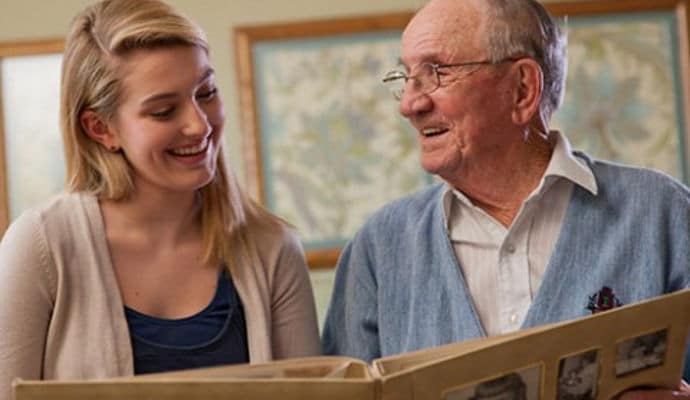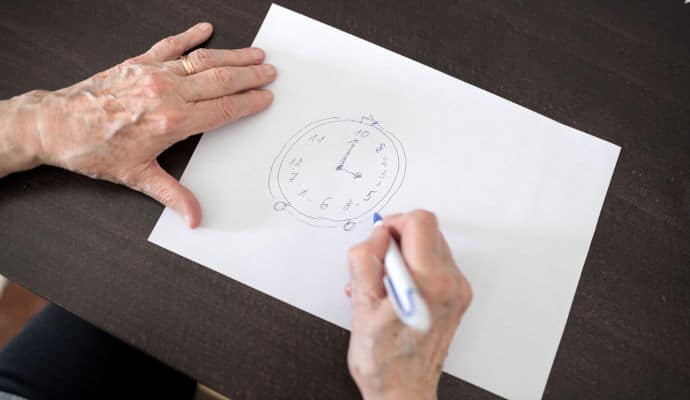For seniors with dementia, traditional storytelling can feel frustrating when memories fade, but TimeSlips flips the script by celebrating imagination instead of facts. This innovative, evidence-based activity uses open-ended images to spark creative group stories, where every contribution is valued, and there are no wrong answers.
Perfect for all stages of dementia, TimeSlips reduces anxiety, boosts self-expression, and creates joyful connections between caregivers and loved ones. Discover how this simple yet powerful approach can turn “I don’t remember” into “Let me tell you a story!”

Creative Storytelling Can Help You Connect With Older Adults
Finding different ways to connect with seniors with Alzheimer’s or dementia is a constant challenge.
But a free program called TimeSlips is helping seniors and caregivers have fun together. Their website offers a variety of fun conversation and activity suggestions.
One of their activities uses fun images to inspire creative stories. This allows seniors with dementia to use their creative side and enjoy an activity with no right or wrong answers.
This way, they can express themselves without feeling any pressure or expectations.
We explain how TimeSlips storytelling works, how to use their website, and how to create your DIY version of this activity.
TimeSlips Help Seniors With Dementia Use Their Imagination
TimeSlips is a free website that allows caregivers and seniors to get creative and tell stories.
Ask an older adult their thoughts about the photo using a fun image and the optional questions.
Their response begins the story, engaging their imagination and creating a fun story for you both to enjoy.
Give them plenty of time to discuss the image. If the conversation stops, ask another simple question to keep the story going. You can write the stories down or chat and enjoy the conversation.
These activities for seniors with dementia can be done anywhere and will keep you entertained and engaged. You can make the story as short or long as you want. Anything goes as long as your older adult is having fun.
You can also browse stories created by other people. We made a story of our own – check out the screenshots below:

The TimeSlips story we created

TimeSlips questions get the creative juices flowing (optional)
How to use the TimeSlips website
To use the TimeSlips website, you must sign up for a free account.
After creating your account, choose the “Make Up a Story” activity.
Having an account also allows you to write and save the story you and your older adult create together. You can publish the story publicly to the TimeSlips site or keep it private.
To make it even easier, a helpful video walks through how the website works and shows how to create a story.
Note: TimeSlips also offers training classes and certification in their storytelling method. Discounts are available for family caregivers. Get details here.
Create Your DIY Activities for Seniors With Dementia
If you don’t want to create an account on TimeSlips, you could use any images you have that might be fun to discuss. You could find pictures in books, magazines, or anywhere online.
Show the image to your older adult and ask a simple question about the image to get the story started.
For example, you could use a picture of your friend’s dog and ask, “Where is this dog going?” or “What is this dog’s name?”
Recommended for you:
- 12 Engaging Activities for Seniors with Dementia: Reduce Agitation and Boost Mood
- 10 Activities for Seniors with Alzheimer’s: Inexpensive DIY Ideas
- 6 Alzheimer's Sensory Activities Reduce Anxiety without Medication
About the Author

Connie is the founder of DailyCaring.com and was a hands-on caregiver for her grandmother for 20 years. (Grandma made it to 101 years old!) She knows how challenging, overwhelming, and all-consuming caring for an older adult can be. She also understands the importance of support, especially in the form of practical solutions, valuable resources, and self-care tips.














Are there any activities for seniors with Dementia with low vision and hearing deficits.
We’ve got a variety of suggestions that someone with low vision, hearing loss, and dementia may enjoy. They may like activities that appeal to the senses that are still working well, like touch and smell. It might take some trial and error to find the activities that your older adult will enjoy most.
Try these suggestions or use them as inspiration for your own creative ideas:
— 9 Entertaining Activities for Low Vision Seniors with Alzheimer’s or Dementia https://dailycaring.com/9-activities-for-low-vision-seniors-with-alzheimers-or-dementia/
— Audio Books for Vision Impaired Seniors: Free Library Service https://dailycaring.com/audio-books-for-vision-impaired-seniors-free-library-service/
— 6 Alzheimer’s Sensory Activities Reduce Anxiety without Medication https://dailycaring.com/6-alzheimers-sensory-activities-reduce-anxiety-without-medication/
— The Positive Effect of Therapy Dolls for Dementia https://dailycaring.com/the-positive-effect-of-therapy-dolls-for-dementia/